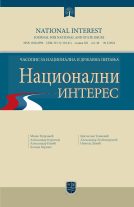- Home page
- Researchers
- Miloš Tomić
Miloš Tomić
Fakultet bezbednosti, Univerzitet u Beogradu

SECCESION VERSUS NATIONAL INTEREST: UNILATERAL DECLARATION OF INDEPENDENCE OF KOSOVO AND METOHIJA
The raising of the issue of "independence" of the southern Serbian province for many years has been marked by various types of spin on the legitimacy of the secessionist demands of the Albanian ethnic group. The explanatory value of secession theories in the case of Kosovo and Metohija has not been fully validated, especially due to the fact that the Albanian national minority had a degree of autonomy before the conflict broke out. A systematic review of domestic and foreign research materials (theoretical and empirical findings) revealed a certain degree of deviation of the research results (consciously or not) from the real factual situation. Namely, a certain group of foreign authors, while analyzing the political and security situation in Kosmet, during and after the 1990s, constantly stigmatized the Serb side as the sole culprit for the outbreak of violent conflict, unlike the Albanian ethnic group (arbanas) as the only victimizing actor. On the other hand, a number of local authors in their works detail the dynamics of the development (cause, cause and effect) of violent conflicts caused by internal (terrorist group "KLA" 9 and external factor (NATO aggression). The precedent in international politics that has come about in recognition of the unilateral declaration of independence of Kosovo and Metohija is directly linked to the contestation of the national interest of the RS in maintaining its territorial integrity. The paper describes the political and security relations of two diametrically opposed positions of major powers on the legality of the unilateral declaration of independence of the southern Serbian province. The crisis of multilateralism that existed during the Cold War is taking on a new dimension following the armed aggression of the NATO Pact on the Federal Republic of Yugoslavia. In this context, the political economy of the attempted secession of Kosovo and Metohija after 1999 is conducted under the patronage of a provisional international civil-military administration. Permanently contesting the pursuit of any interest of the Serbian people in the area of its centuries-old existence is a feature of the inconsistent policy of a part of the international community guided solely by its hegemonic goals.

